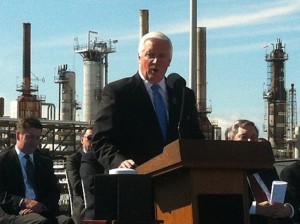Shell buys more land at possible cracker site but still hasn’t decided whether to build

Susan Phillips / StateImpact Pennsylvania
Former Gov. Tom Corbett agreed to $66 million a year in tax breaks if Shell builds an ethane cracker in Beaver County.
Shell Chemical on Wednesday confirmed its purchase of the site of a former zinc smelter in Beaver County but said it still hasn’t decided whether to go ahead with construction of a major petrochemical complex that would include an ethane cracker.
“Shell can confirm that we have closed on our land purchase of the former Horseheads property,” said Ray Fisher, a spokesman for the Dutch oil giant, referring to the operator of the smelter. “However, we have not made a final decision to build the project; we will make that decision when our full project evaluation is complete.
“The land purchase is a necessary step for Shell to advance the permitting process, and allows us to proceed with some preliminary site-development work,” Fisher said in a statement.
He refused to confirm a report in the Pittsburgh Post-Gazette that the company paid $13.5 million for the western Pennsylvania smelter site after buying 12 other nearby parcels for a total of $13.8 million.
The purchase comes four years after the company said it was considering building the multi-billion-dollar plant, which would convert ethane from the Marcellus Shale into ethylene for use in a range of products including plastics, solvents, and antifreeze.
Shell’s announcement in June 2011 that it was looking at the site in Monaca, 25 miles northwest of Pittsburgh, was hailed by state officials as a potential major boost for the state’s economy — with the creation of up to 10,000 jobs at the peak of construction, and some 400 permanent positions – and as a further vote of confidence in the potential of the Marcellus Shale’s huge natural gas reserves.
The state under former Gov. Tom Corbett persuaded Shell to choose western Pennsylvania over several competing locations after agreeing to tax breaks worth $66 million a year, based on production.
The company said at the time of its announcement that it had chosen the site as a potential location for a “world scale” petrochemical complex because of its good access to liquids-rich natural gas and water; good road and rail links, and enough land for possible future expansion.
If built, the complex would include an ethane cracker capable of making 1.5 million metric tons of ethylene a year; three polyethylene units producing an annual total of 1.6 million metric tons, as well as plants for power and steam generation, cooling water and water treatment. The company has not said how much the plant would cost.
Any decision to go ahead with construction would be based in part on obtaining permits from the state, the company has said.
Department of Environmental Protection Secretary John Quigley told StateImpact that more DEP permits will be issued to Shell this week. These include pollution discharge permits (NPDES) and storm water run-off permits for the site.
“So in terms of assisting the company in the decision-making process and getting the pieces of paper they need from state government to continue to analyse the possibility of making this investment, we’ve done our job.”
“They needed to be sure that they could obtain permits from state government as part of that decision-making process. So to the best of my knowledge, they’re on track and we’re looking forward to their decision.”
John Poister, the DEP’s community relations coordinator, said that over the last 18 months, Shell has applied for permits on air and water quality, water obstruction, and storm-water management, as well as to transfer a permit on discharges that was held by the smelter’s former owner, Horseheads Corp.
The permits would be needed for the company to complete any preliminary work on the site, after which it would need additional permits to build the plant, Poister said.
“To date, we have not seen their plans so it would be premature to speculate on future permitting,” he said.
If it decides to go ahead with the project, the company said it will take “several years” to build.
















